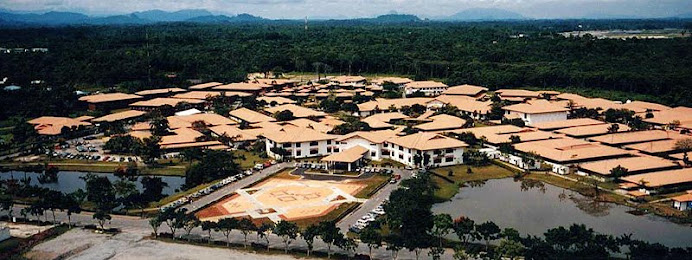From my dorm, the old campus is a twenty-five minute walk along a road paved through jungle. Compared to the new campus it is much smaller and more compact, resembling a high school or a summer camp. Nearly every building is connected by a covered walkway. It feels much more like Whitworth.


The photo at the top of this blog is an aerial view of the old campus. That main building is where the Faculties of Social Sciences and of Economics and Business are stationed. These are the only two departments which haven't yet made the leap over to the new campus. Their buildings are awaiting funding and completion.
The old campus is where all of my classes except the Malay language course will be. It's a minor inconvenience that I live on the new campus, but UNIMAS owns a dozen air-conditioned tour buses that shuttle students around the new campus as well as back and forth from the old campus. The bus comes often enough, and I'm sure the housing here is slightly nicer than there.


Classes officially started last week, but due to all the public holidays most lecturers, staff, and students stay on break until this week. Last Monday was Maal Hijrah, the Islamic commemoration of Muhammad's migration from Mecca to Medina and the beginning of the new Islamic year. Thursday was New Year's Day. Malaysia is a land of many public holidays because it tries to recognize the major celebrations of Malays, Chinese, and Indians, as well as Muslims, Christians, and Hindus. Noteworthy is that compared to the Peninsular Malaysian states, Sarawak has very few Indians, so it's the only state in Malaysia which doesn't recognize Deepavali, the Hindu festival of lights.
So far I've attended only one lecture. When I walked into Mr. Stanley's Wednesday-morning Malaysian Political System class, he was speaking Bahasa Malaysia. Once I descended the steps of the big lecture hall and took my seat, he announced that the remainder of the class as well as all student presentations would be in English. I felt like an ass, but I also recognize Mr. Stanley's point that it benefits the students to conduct class in English. It was discovered a few years back, he explained, that university graduates were not getting sufficient employment, and a major reason was found to be their inability to communicate with employers in English. That is why UNIMAS was the first of Malaysia's public universities to adopt an unwritten rule that all courses would be taught in English. Apparently that rule is still somewhat flexible, but my presence, I suppose, gives Mr. Stanley a good excuse to abide by it. It also shifts any ill will about its enforcement from him to me!

Eighty students had already enrolled in the course by last Wednesday, yet only eight of us showed for the first lecture. They say that's not abnormal for the first week. As with all of my courses here, Malaysian Political System occurs once a week for three hours. In about forty-five minutes Mr. Stanley lucidly covered all of the basics of Malaysia's political system, and then declared the class over for the semester. He'd gone over everything the course was intended to cover, he said. But those who wanted to read more, to dig deeper, to keep up with current events, to understand and debate the issues at a critical level could stick around and do so. Pretty inspiring tactic if you ask me.
For another forty-five minutes Mr. Stanley dove head first into the most controversial Malaysian political issues of the day. He explained how most countries including the U.S. have affirmative action, but whereas it is typically designed to benefit minorities, Malaysia's affirmative action benefits the political and popular majority, Malays.
The three other political science courses I'm signed up for are Introduction to Malaysian Social History and two upper division courses called ASEAN Politics and Political Ecology.
------------
Around Samarahan and Kuching (English: cat) you occasionally see homeless dogs and cats. You may also spot someone driving on the right side of the rode, which here – as in the UK – is the wrong side of the rode. If you're lucky, you can find the ping-pong player pictured below serving up some mad spin.











